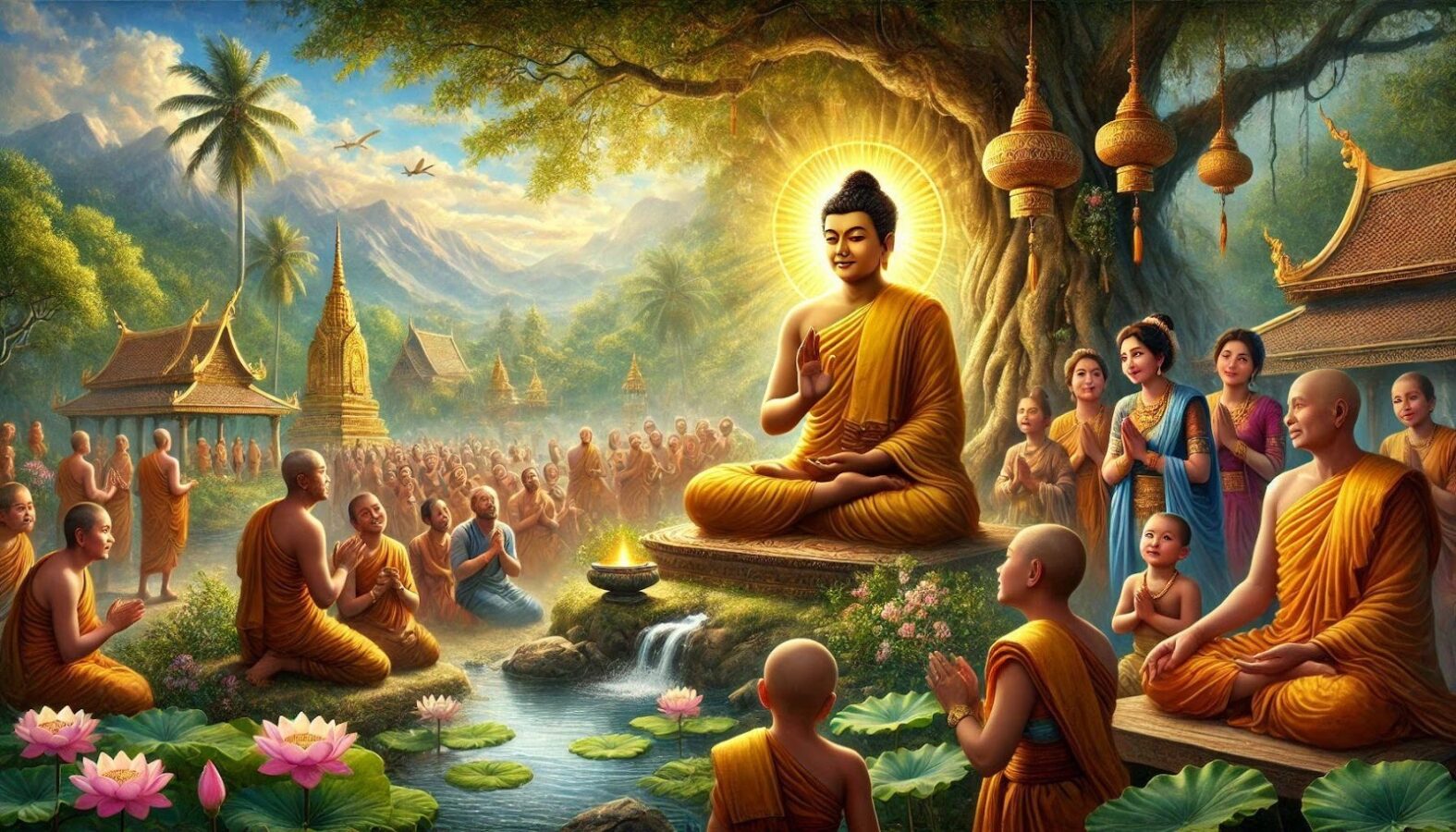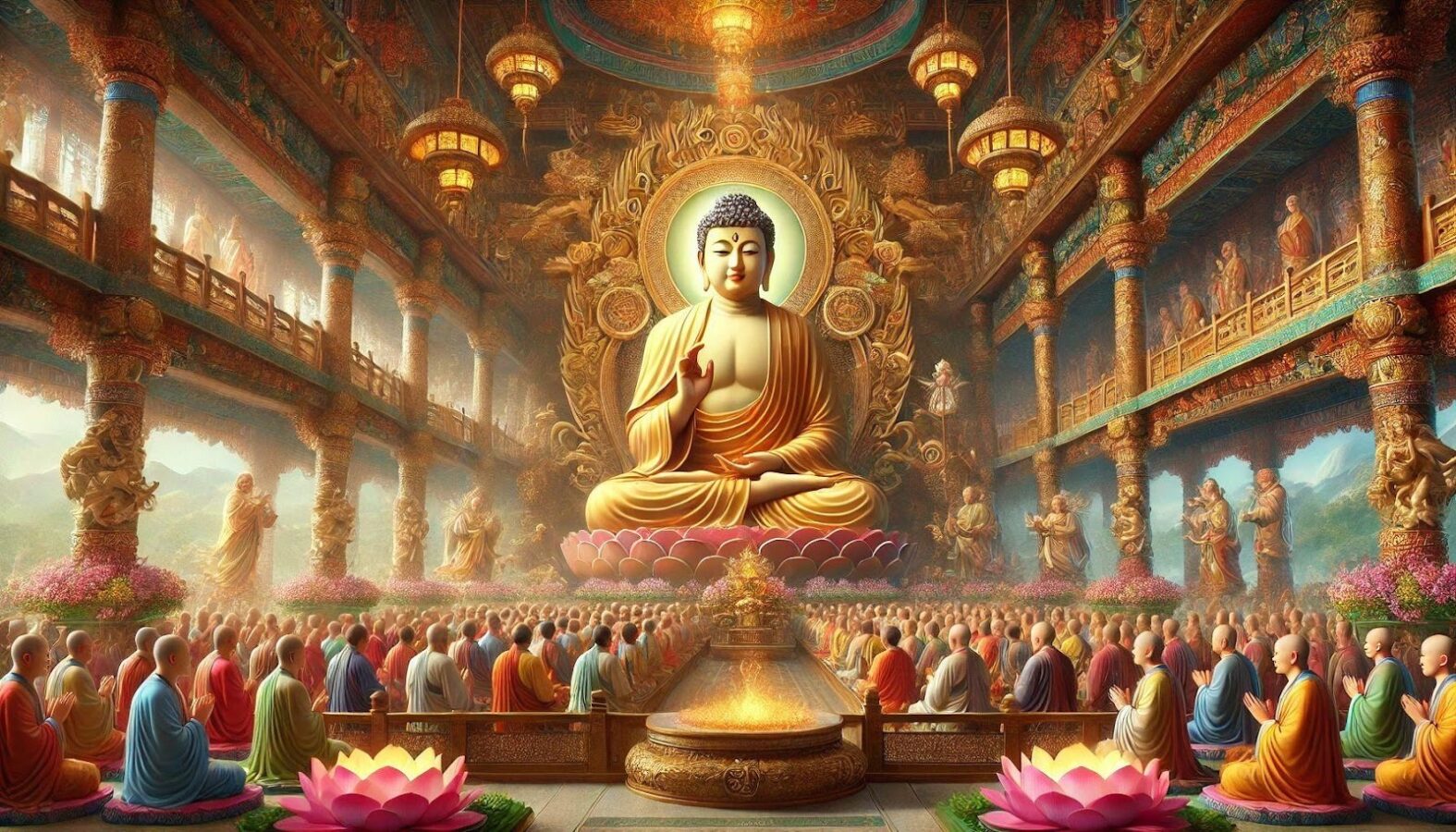
Date: 03/01/2025 03/02/2025
Location: Star Lake Meditation Center
Teacher: Shilin Long
Dharma Talk
The Attainment of Fruition by King Vagga
During the time of the Buddha, King Vagga was very close friends with King Bimbisāra of the Kingdom of Magadha. One day, King Vagga gifted King Bimbisāra a flower adorned with the seven precious materials, including gold, silver, and lapis lazuli. Knowing that King Vagga had never heard the teachings of the Buddha, King Bimbisāra decided to offer the flower to the Buddha instead. King Bimbisāra told the Buddha, “King Vagga is my dear friend. He gifted me this precious and magnificent seven-jewel flower, and now I offer it to you in the hope that through this merit, he may let go of his prejudices, open his mind, and come to pay homage to you, listen to the Dharma, and from then on, revere the Three Jewels. However, I have one concern—I do not know what I should prepare to reciprocate his generous gift.”
The Buddha told King Bimbisāra, “You should transcribe the Twelve Links of Dependent Origination Sūtra and send it to King Vagga. Once he receives this scripture, he will surely begin to have faith in the Dharma.”
Upon hearing this, King Bimbisāra immediately transcribed the scripture and included a message to King Vagga: “You have gifted me such a precious and magnificent jewel flower, and in return, I offer you the flower of the Dharma. If you contemplate its meaning, you will surely understand the principles of cause, condition, and result. I hope that once you receive it, you will read and recite it at once so that you may taste the flavor of the Dharma.”
Indeed, after reading and reciting the scripture repeatedly, King Vagga deeply contemplated its meaning and immediately developed faith and understanding of the Dharma. He exclaimed in praise, “The Dharma is truly subtle and profound! It brings peace to the mind and prosperity to the nation. The wealth, beauty, fame, food, and sleep I once pursued were, in fact, the very roots of affliction. For countless lifetimes, I have been deluded, but today I finally see the truth of life. There is nothing in this world truly worth greedily craving and indulging in.”
Thus, King Vagga gathered his ministers and announced that he would abdicate the throne to his prince and shave his head to become a monk.
After renouncing his royal status, King Vagga wished to seek the teachings and precepts from the Buddha. He put on monastic robes, took his alms bowl, and began his journey on foot toward Rājagṛha. As night fell before he reached the city, he decided to stay overnight at a potter’s house so that he could enter the city for alms in the morning and then visit the Buddha at the monastery to formally receive the precepts.
Using his divine insight, the Buddha foresaw that King Vagga would unexpectedly die while collecting alms the next day. Not only would he be unable to see the Buddha, but he would also miss the opportunity to listen to the Dharma. Filled with compassion, the Buddha manifested as an ordinary monk and went to the potter’s house, seeking shelter for the night. The potter said, “Earlier, another monk also came to stay the night. He is currently resting inside the kiln. You may stay there with him.”
The Buddha took a bundle of dry grass and entered the kiln, sitting in a corner. He asked, “Venerable monk, where do you come from? Who is your teacher? What inspired you to renounce the world? Have you ever met the Buddha?”
King Vagga replied, “I have never seen the Buddha before. However, after reading the Twelve Links of Dependent Origination Sūtra, I resolved to become a monk and cultivate the path. I plan to enter the city for alms tomorrow and then go to see the Buddha!”
Hearing this, the Buddha said, “Human life is extremely fragile, changing rapidly from morning to evening. We cannot predict when impermanence will arrive. We must always contemplate that the body is merely a temporary combination of the four great elements—earth, water, fire, and wind. When we die and decay, these elements simply return to their original state. There is no need for fear or distress. At the same time, one should maintain mindfulness, avoid delusions, and wholeheartedly take refuge in the Buddha, the Dharma, and the Saṅgha. One should also practice generosity, uphold pure precepts, and realize the truth of impermanence. If you do this, it is just as meritorious as personally seeing the Buddha. Simply thinking about meeting the Buddha tomorrow will not bring you any real benefit!”
Then, the Buddha spoke a verse:
“It is truly fortunate for one to take refuge in the Buddha.
Thus, one should day and night,
Always be mindful of the Buddha, the Dharma, and the Saṅgha.
Those who realize self-awareness,
Are truly disciples of the Buddha.
Day and night, they should constantly reflect on:
Impermanence of the body,
Precepts, generosity, and merit,
Emptiness, non-attachment, and cessation of thoughts.
These should be contemplated day and night.”
The Buddha then further expounded on the doctrines of suffering, emptiness, and impermanence. Deeply absorbed in these teachings, King Vagga concentrated his mind, entered meditative absorption, and attained Anāgāmi (the fruit of non-returner). The Buddha, seeing that King Vagga had realized the truth, restored his original, radiant, and magnificent Buddha form.
King Vagga was overjoyed upon seeing this and immediately prostrated to the Buddha. The Buddha once again reminded him, “When impermanence comes, do not be afraid!” King Vagga respectfully accepted the teaching and vowed to follow it faithfully.
The next morning, King Vagga entered the city for alms. Near the city gate, he was fatally gored in the abdomen by a mother cow who had just given birth and was protecting her calf. However, since he had attained the fruit of non-returner, he was reborn in the Anāgāmi Heaven upon his death.
Upon hearing this, the Buddha instructed his disciples to perform cremation rites for King Vagga and build a stupa in his honor. The Buddha then admonished his disciples, “The root of evil karma must be carefully guarded against!”

